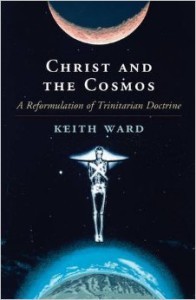A Triune God Who Essentially Loves Creation
Most open and relational theologians believe God is essentially loving. But if Keith Ward is right that God is not a social Trinity, how can God love be an essential attribute of God’s nature? Must God love, create, and be related to creatures?
In my previous blogs, I noted that in his new book, Christ and the Cosmos, Keith Ward says the social Trinity “is a bad idea.” I praised Ward for his general view of God in my first blog (click here). I looked at the biblical support for the social Trinity idea in the second (click here). I admitted that the social Trinity idea is attractive to those who, like me, want to say love is inherently relational and love is an essential attribute of God’s nature.
Must a Non-Social Trinitarian God Create Finite Others?
One way to affirm that God is essentially loving is to say God necessarily creates creaturely others. And God has always – everlastingly – been doing this creating.
I find this proposal a plausible account for the primacy of creative love in God. It does not require belief in a social Trinity, because it says God everlastingly loves finite creatures whom God creates.

In Christ and the Cosmos, Ward affirms love as essential to God. So I wondered what he thought of the idea that God has always been creating and relating to creation. It turns out, he doesn’t think much of it.
In several passages, Ward seems open to the possibility. He argues, for instance, that “having a universe is a necessary condition of realizing values of creative freedom, self-development, and cooperative relationship” (26). “If God is essentially love,” he says, “then some form of creation of others may indeed be a natural expression of the divine being.”
But Ward immediately follows by saying, “That does not mean that God must necessarily and always have created others to love. It means only that the expression of God’s nature makes it natural that God will (not necessarily without beginning or intermission or end!) at some point create other persons in order to realize the divine nature as loving in relation to them” (180).
Ward doesn’t want to say God must create. But notice Ward’s use of “natural” in this quote. He uses it twice. I’ll return to this in a moment.
Must a Non-Social Trinitarian God Relate to Finite Others?
Related to the question of whether God must create is this: Must God be related to some universe and/or creaturely persons? I think so. Ward is open to that idea too.
“If God is a relational being characterized by love,” says Ward, “that relation must be to non-divine persons, and not a sort of secret self-love” (182). Ward’s reference to a “secret self-love” is a jab at the concept of the social Trinity idea that God necessarily loves within Godself but contingently loves creation.
In another section, Ward entertains a thought experiment on this issue: “It might be possible to hold that God, if and in so far as God is truly love, must be related to some form of other being. If so, God necessarily creates something other to which to be related.…” (124). Notice that Ward (rightly) connects God necessarily creating with God being necessarily related to creation. Ward is expressing here the position I find plausible.
Immediately after these words, however, Ward says, “That is an interesting possibility, though most Christian theologians have not accepted it. I admit that I am half-inclined to accept it, though I draw back at the thought of presuming to know what is necessary for God to be God” (124).
This last sentence is especially important. Several times in his book and in our private conversations, Ward says he is wary of saying God necessarily relates to creation. He doesn’t want to appear to know what God necessarily does. He’s reticent to speculate about God’s nature.
Should We Speculate about God’s Nature?
At several points in the book, Ward says it is proper to talk about how God appears to us. But he is wary about statements pertaining to God’s nature. Instead of saying “God necessarily does…” or “it is God’s nature to…,” Ward typically uses the word “natural” to explain why God acts in one way rather than another. “It is natural” for God to do something.
For instance, Ward says that “an agape loving God would have to create some other persons… [but] it is not clear that God necessarily has to love in an agapistic way, even though it might be natural for God to do so…” (192).
Ward is pondering the possibility of God necessarily loving others. After all, a relational but non-social Trinity of love seems to require the existence of creaturely others. It would be “natural” for God to love nondivine others, says Ward, but not necessary.
Or take this quote: “I am not convinced that God can only realize the divine nature by creating a new universe so that creation becomes necessary to God be what God is,” says Ward. “But I do accept that God has actually expressed the divine being as agapistic love by the creation of finite persons. I think this must be seen as a normal and proper expression of the divine nature, but I regarded as a step too far to say that this is what God had to do it and that there is no other way in which God could fully be God” (220).
Ward appeals to what is “normal and proper” in this passage. This is similar to how he uses the word “natural” in other contexts.
It seems to me that Ward’s words “normal and proper” or “natural” function in his theology the same way that “necessary” and “essential” function in other theologies. Interestingly, the word “natural” is a cousin to the word “nature.” It is natural for a thing or being to do what is its nature. To claim something is a being’s “proper expression,”as Ward puts it, suggests we know something about the “properties” of that being.
When I completed my reading of Christ and the Cosmos, I could not see any real difference between Ward saying God “naturally” or “properly” does something and my view that God necessarily or essentially does it. The semantic difference is negligible.
While I endorse Ward’s reluctance to over-speculate about what God must, may, or cannot do, we both eventually end up making claims about at least some aspects of God’s nature. Such speculation seems inevitable. And I suggest that Ward’s own language betrays his aversion to speculations about God’s nature.
A Non-Social Trinitarian God Who Necessarily Loves, Creates, and Relates
In my view, Ward should embrace the view that God necessarily and everlastingly creates, relates with, and loves finite others. Apparently the only thing holding him back is his reluctance to speculate about God’s essence. In my view, that’s not a strong enough reason.
In the next and final segment of my review of Ward’s book, I’ll make a case for a non-social Triune God who necessarily loves, creates, and relates. Such a case seems important if I am to avoid the tritheistic implications of the social Trinity and yet embrace the view that, as Charles Wesley put it, God’s “name and nature is love.”

Comments
Dr. Oord,
If the scriptures do not use the word Trinity and you seem to reject the concept of the Social Trinity as trithestic, then why hold on to the term Trinity at all?
Timothy B
Good question, Timothy. I do think there are some good reasons to think that God’s ways of acting toward creation are multiple. One primary way is the revelation of God in Jesus Christ.